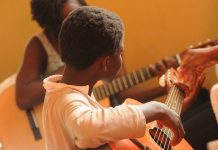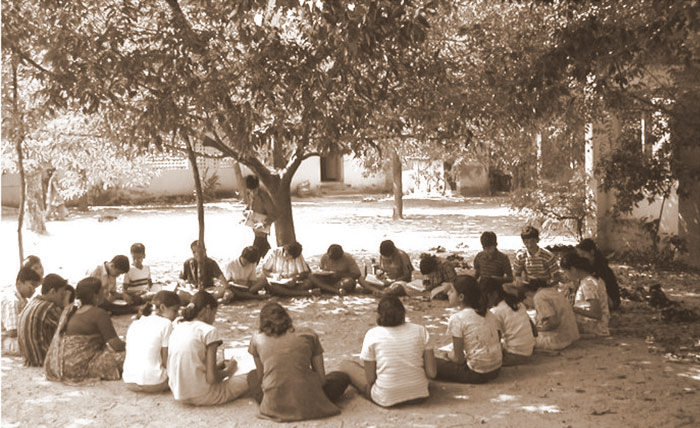
When learning spaces lose their graded hierarchies and turn into communicative spaces, true learning becomes possible. Here an educator explores this possibility and offers many insights to make our own classrooms interactive and egalitarian spaces.
By Rohan D’Souza
The classroom and the school in general are seen as spaces where a child learns to get equipped to face the world. If we pause this notion for a bit to delve into what this equipping entails as well as what it means to prepare a child for the world, it could perhaps reveal possibilities that go beyond the standard ideas of transfer of knowledge. If we could investigate and interrogate this approach to education that presupposes the power of knowledge and its transfer in the form of capsules of information as the main objective of education, we could perhaps arrive at a different notion of education.
Mainstream education, especially in India, seems to be intent on working on children to gain knowledge and information in various subject areas, be it the physical sciences, social sciences or languages. The pedagogical approach centres around classroom based lecture modes where the teacher opens up ideas and concepts in these subject areas for the children to understand and consume for later retrieval in spaces such as exams and assignments. While it is important for children to learn more about the natural and social world and how to decipher languages, it perhaps is also time to look at what drives and also defines each one of us in our own eyes as well as others and is the main mode through which we negotiate the world, our egos. The ego as it gets constructed and nourished over years seems like a solid entity that is a good sensor of interpersonal interactive needs. It directs our behavioural patterns and suggests that it helps us navigate this world.
What role does the school and the classroom play in nurturing the ego and the sense of self that we develop? Or to put it another way what role does schooling play in making us aware of this seemingly solid entity and its role in driving our actions? Character building programmes are a conscious or unconscious part of schooling initiatives, where the suggestion is that character or personality of a particular kind is desirable in the social and cultural contexts we live in. These could also perhaps be linked to morality that socio-religious environments nurture and make us predisposed to.
But then, where is the problem or difficulty in this approach as it seems to develop individuals of a particular type who will be functional socially and will ensure continuity of social mores?
Perhaps what this approach overlooks is that it is difficult to assign and fix a value or a character to something that is forever morphing based on drives and desires and is being reshaped every little while. Recognition of this fact could be a good starting point to enter into the role education could play in this realm. It also could then suggest that deviations from presupposed behavioural outcomes of character building models are, well, normal! If we take this thought and perceived solidity assigned to the ego lightly, then thats a good space to start at. As children navigate their way through life and its many spheres; be it home, school, sports club/stadium, dance/music class, entertainment centres, they are repeatedly receiving the message of the idea of individuality and what it takes to be ‘strong’ personalities. How would such constructions play out in the classroom? What does it mean to lighten or unburden the ego in a school environment? How would the baggage that the ego accumulates over the years present itself in the classroom?
The culture of pleasure and consumption as a means to arrive at that seems to be the predominant mantra of the modern globalised world. As economies across the world link more than ever before, vast array of items for consumption present themselves. This then feeds into the perennial human condition of constant craving. Earning the means to satisfy consumption based wants is seen as the goal of living. How does education fit into this model? Does it at one level motivate higher levels of competition for grades, seats and a range of academic achievements and at another level foster spaces for egoistical and individualistic jostling? The drive to get ahead of others in the academic front sets up occasions for interpersonal conflict and hurt among children. What then could be the role of education in this context and what opportunities can the classroom present?
A good place to start would be with the educator. If s/he can approach the classroom and interaction with the children in a less authoritative manner, that would be the starting block of building a relationship that places hierarchy, authority and other such structures that we are so used to in a tentative hold. Is it possible for a teacher to behave in a non-authoritarian manner and still achieve educational objectives? Yes, as that itself can be seen as an educative objective; of creating an environment of learning that is not ruffled by the undercurrents of fear. How would children respond to this shift in interactional dynamics? Would they take advantage of the loosening of hierarchical hold and take the teacher for granted or even start ridiculing the teacher? Some of this may happen, but what will certainly blossom is a relationship that is based on trust and affection, which can then enable communication that is not between two egos enmeshed in a web of hierarchy.
It is also an opportunity for the teacher to learn about her/his patterns of behaviour conditioned by the perceived need to control and perhaps even dominate children. It may not be easy to move from a position of power and interface with children on a more level playing ground, so to say. It will definitely require more effort to be put in to build and maintain a relationship. There will also be a tendency to err on the popular side; to become a fun, ‘cool’ teacher who is popular. That too has its pitfalls as it is building in the teacher a need for the ego to be constantly reaffirmed through applause and appreciation. This doesn’t mean that the interaction cannot be light, even playful. It can and perhaps even should be so, so that the seriousness with which adults hold themselves can be loosened.
Now that the ground is set for building a relationship that attempts to recast the role of a teacher from being an authority figure to that of a friendly adult, what next? The play of the ego in the young mind; be it in the classroom or other spaces of interaction with the teachers offer many opportunities. In the classroom setting, a child in order to gain the teachers attention and perhaps even respect and impress her/his classmates, could try and hog ‘airspace’ so to say.
She/he could try and dominate the proceedings by responding fast to questions, raise doubts regularly and so on. What is the role of the ego in this and how can a teacher respond to this with compassion but corrective methods? One approach could be to appreciate the child’s enthusiasm and keenness to please but also remind her/him about the need to allow others to also participate. This would of course need to be done not in an admonishing tone but as a friendly yet firm suggestion. What also would help as a follow up is a one on one chat with the child after class. In my experience, I have noticed that children have the sensitivity to appreciate honest feedback shared with affection. This feedback could include making observation of behavioural patterns and encouraging the child to reflect on the need for those patterns. This would work better than pointing out the patterns and asking them to refrain in a blunt manner.
There can also be other modes of participation in the classroom that can offer opportunities to look at the ego expressing itself. This could be disruptive behaviour by a child in class, which could take the form of funny remarks or even sarcastic or rude ones directed at the teacher or classmates. In the latter cases the ego hurt will be spread across more than one individual. In these cases, the teacher would need to stem the flow of such behaviour but probably not sternness and anger as the only option. A little bit of sternness quoted with some humour could certainly help defuse such situations, especially in the case where humour as a form of disruption is used by the student. One could go with the flow, so to say, and help lighten the mood of the class also. But then drawing the class back to the topic being taught/discussed is also equally important in order to avoid drift. In the case when anger and disruption that flows from it is expressed, one could ask the child to relax and calm down, aided by a smiling countenance. If this doesn’t work, it would make sense to take the child outside the class and attempt to reason and suggest that s/he take a break and talk to the teacher later. This, like in the previous case outlined, will need to be followed up with a conversation with the child. A reflective mood would then need to be created to make observations to the child about the display perhaps being the need for attention, which is fuel for the ego. An invitation for reflection would also be useful and perhaps also necessary in such cases.
The ego also displays itself in interaction among children in the classroom where various patterns such as dominance, envy, dislike, anger would colour the interface. If it takes the form of conflict among children, friendly fire fighting in the classroom, perhaps again also aided by some humour could help defuse the situation for the moment. What would be essential in such cases also would be a follow up conversation with the conflicting parties. They would be need to be heard out, where it would usually take the form of blaming the other. The ego when hurt seeks for reasons from the outside and is rarely able to reflect on behaviour generated from within. Encouragement should be given to reflect on exploring the pushes from the inside that caused particular responses. What would also help is to make observations of patterns of the conflicting children of getting locked into each other’s egos over a period of time, if that is the case. It is always helpful to try and help the children not to assign behaviours and judgements that come from that to others. The continuing swirl of behavioural responses that could range from the pleasant to the unpleasant and anywhere in between will need to be pointed out to. This can possibly help them to understand that there are changing behaviours and no particular firm pattern that the ego takes.
As mentioned earlier, all of this would need to take place in the spirit of building a non-hierarchical relationship with the children. Would this be possible even in schools where the number of children is large? I would say that some time and effort could go into building these relationships even in these cases. It could even mean simple things like communicating friendliness through a smile, a recognizing nod and perhaps even encouraging children to not be in awe of or fearful of teachers. It will call for some effort and investment in terms of time and mindfulness, but at the end of the day it can be a worthwhile enterprise. The teacher and the taught can meet in a space that is not burdened by pulls of the ego.
Rohan D’Souza is an educator with the Centre for Learning Bangalore. He is interested in the possibilities that an education guided by mindful thought and awareness can offer.
This article is published in The New Leam, April Issue( Vol.2 No.11) and available in print version.
To buy contact us or write at thenewleam@gmail.com
Or visit FlipKart.com
If You Liked the article? We’re a non-profit. Support This Endeavour – http://thenewleam.com/?page_id=964













